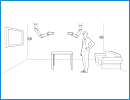Research Projects
Project "VEREINT" - Feeling connected through interactive technologies. Sponsored by the Federal Ministry of Education and Research (BMBF)


Connectedness is central to psychological well-being. Connectedness is the "feeling of having regular intimate contact with people who matter to you, instead of feeling lonely and unappreciated. In everyday life, this need is satisfied through a variety of practices, such as shared activities. Mediating technology (e.g. telephone, video conferencing systems) also plays an important role in connectedness. The aim of the funding programme "Proximity over Distance - Enabling Interpersonal Connectedness with Interactive Technologies" is to explore forms and concepts of technology-mediated connectedness in application projects.
The accompanying project "VEREINT" provides theoretical and methodological support for these application projects, systematises the existing knowledge in the form of overviews and method cases, deepens open topics through its own research, networks the application projects with each other and tests active forms of science communication in the form of citizen labs and a library of proximity. The focus of the sub-project is on model building and method development on questions of acceptance of connectedness technologies as well as the development of research formats for networking the application projects.
Project duration: 01.02.2023 – 30.04.2026
Project management: Prof. Dr. Sarah Diefenbach
Projekt "MOVEN" - Motivational and behavioural sustainability technologies. Sponsored by the Federal Ministry of Education and Research (BMBF)

 The MOVEN junior research group focuses on the active role of technology in encouraging people to behave ecologically in order to achieve sustainability goals. The interdisciplinary junior research group is led by Dr Matthias Laschke, University of Siegen. At LMU Munich, Prof. Sarah Diefenbach is leading the sub-project on the psychological perspective.
The MOVEN junior research group focuses on the active role of technology in encouraging people to behave ecologically in order to achieve sustainability goals. The interdisciplinary junior research group is led by Dr Matthias Laschke, University of Siegen. At LMU Munich, Prof. Sarah Diefenbach is leading the sub-project on the psychological perspective.
The starting points of the project are the goal of reducing individual energy consumption and the accompanying fundamental changes in personal lifestyle. The aim is to transfer new, more energy-efficient practices into people's everyday lives. In addition to the motivation and knowledge to behave in an environmentally conscious way, designed things play a central role in almost every everyday practice. Thus, the design of things is also a starting point for consciously shaping and changing people's actions. For the application areas of process heat (e.g. washing and cooking), hot water and heating energy, concrete interactive, potentially behaviour-changing systems are designed, prototypically implemented, empirically tested in studies and ethically, legally and socially reflected.
Project duration: 01.08.2022 – 31.07.2027
Project management: Prof. Dr. Sarah Diefenbach
Project employee: Lara Christoforakos, M.Sc.
Further information: www.sustainabilitybydesign.net
Project GLOBE 2020 Research Programme
 The GLOBE 2020 research programme complements the GLOBE project (Global Leadership and Organizational Behaviour Effectiveness), which has been known worldwide for 20 years. In the years 1994-2004, this project examined the relationships between social culture, leadership and organisational culture worldwide in 62 countries with the participation of 200 scientists. It became one of the largest and most comprehensive studies of its kind in the world.
The GLOBE 2020 research programme complements the GLOBE project (Global Leadership and Organizational Behaviour Effectiveness), which has been known worldwide for 20 years. In the years 1994-2004, this project examined the relationships between social culture, leadership and organisational culture worldwide in 62 countries with the participation of 200 scientists. It became one of the largest and most comprehensive studies of its kind in the world.
The new GLOBE 2020 project builds on the GLOBE findings and adds many countries and further research topics to the previous data set. In the GLOBE 2020 project, new questions can be answered in a longitudinal temporal section (approx. two decades), e.g. to what extent the national cultures of the N = 62 countries studied so far have changed, and which forces have led to socio-cultural changes. The data basis was more than doubled (N = 144 countries) and previously underrepresented cultural regions were comprehensively added (e.g. African countries and Middle Eastern countries). Longitudinal studies (with a time span of about 25 years) are now possible with GLOBE 2020. New measurement tools have also been developed (e.g. trust, gender bias). Thus, we learn even more and up-to-date about e.g. differences in the perception of leadership by men and women (worldwide) as well as about cross-cultural gender-specific differences in leadership behaviour, but also about differences between different cultural regions and groups of countries and how these aspects are related to people's trust in their own culture and in their respective leadership.
Project management: Prof. Dr. Felix Brodbeck
More information on GLOBE 2020 (and the original GLOBE project) is available via this link.
Project PerforM - Personality for machines in Personal Intelligent Environments. Sponsored by the German Research Foundation (DFG).
 The vision of "ubiquitous computing" formulated by Mark Weiser (1991) describes a world of networked devices that provide new functionalities through their interaction. For example, the idea of the "smart home" encompasses an intelligent technology environment in the home context that makes the lives of its inhabitants easier and safer. From a technical perspective, this is achieved through a multitude of networked devices that work together via common protocols and standards. Problematic from a user experience (UX) perspective, however, is the enormous complexity of interaction with these systems, which tends to stand in the way of widespread dissemination and use. Mark Weiser himself later emphasised that a common and comprehensible interaction paradigm is an important success factor for ubiquitous computing.
The vision of "ubiquitous computing" formulated by Mark Weiser (1991) describes a world of networked devices that provide new functionalities through their interaction. For example, the idea of the "smart home" encompasses an intelligent technology environment in the home context that makes the lives of its inhabitants easier and safer. From a technical perspective, this is achieved through a multitude of networked devices that work together via common protocols and standards. Problematic from a user experience (UX) perspective, however, is the enormous complexity of interaction with these systems, which tends to stand in the way of widespread dissemination and use. Mark Weiser himself later emphasised that a common and comprehensible interaction paradigm is an important success factor for ubiquitous computing.
This is where the project "PerforM - Personality for Machines in Personal Intelligent Environments" comes in and proposes, instead of many devices perceived as individual entities, a superordinate operating concept for the environment as a whole that uses the mental model of a central and omnipresent "spatial intelligence". This spatial intelligence controls existing smart home devices, but can also deal with conventional non-smart devices or any physical object in general, by means of robotic manipulators (e.g. a movably suspended robotic arm). The intelligence embodied in this way thus becomes part of the physical environment, blurring the boundaries between the physical and digital worlds.
In summary, PerforM addresses a number of current theoretical and practical research questions in the context of PCEs and human-machine interaction. In addition to the specific challenges of PCEs, our work programme also highlights overarching questions about the combination of design features and their impact on the perception of "system intelligence", "unity" of a system and ultimately its "personality".
Project duration: 05/2020 – 12/2023
Project management: Prof. Dr. Sarah Diefenbach (Psychology), Prof. Dr. Andreas Butz (Media informatics)
Project employees: Lara Christoforakos, M.Sc., Dr. Daniel Ullrich
Further information: Project website
Project AIPS - Aesthetics of Performative Interaction for Pervasive Computing Environments in Public Spaces. Sponsored by the German Research Foundation (DFG).
 A central challenge in the design of Pervasive Computing Environments (PCEs) is to identify general properties that can be transferred across devices and domains, while at the same time taking into account context-dependent requirements in order to provide a satisfactory user experience. Our research project addresses the "aesthetics of interaction" in the sense of an interaction that "feels" good because it fits the given context and meets relevant psychological needs. We apply this approach in the reference scenario of public smart spaces, an area in which a coherent design of PCEs taking into account experiential aspects and psychological needs seems particularly relevant.
A central challenge in the design of Pervasive Computing Environments (PCEs) is to identify general properties that can be transferred across devices and domains, while at the same time taking into account context-dependent requirements in order to provide a satisfactory user experience. Our research project addresses the "aesthetics of interaction" in the sense of an interaction that "feels" good because it fits the given context and meets relevant psychological needs. We apply this approach in the reference scenario of public smart spaces, an area in which a coherent design of PCEs taking into account experiential aspects and psychological needs seems particularly relevant.
As users perform and experience their own interaction, they also think about how others perceive this interaction and what impression it leaves on others. Social acceptance therefore seems to be of crucial importance for the experience and use of public interactive systems. In a series of systematic studies, we will identify psychological needs and specific requirements for positive experiences and interactions in public contexts. Based on this, we will design, prototype and evaluate interaction concepts in concrete application scenarios (e.g. smart restaurant, airport, registration office).
Project duration: 04/2020 – 03/2023
Project management: Prof. Dr. Sarah Diefenbach
Project employees: Dr. Stefan Tretter, Pia von Terzi
Further information: Project website
An overview of completed research projects can be found here.

